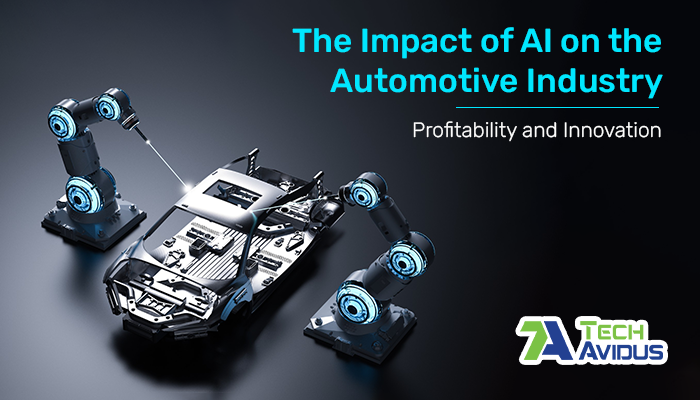
The automotive industry, once driven purely by mechanical advancements, is now entering a new era of innovation fueled by artificial intelligence (AI). From autonomous vehicles to optimized manufacturing processes, AI is reshaping how vehicles are designed, produced, and used. In this blog, we’ll explore how AI is impacting the automotive sector, driving profitability, and fostering groundbreaking innovation.
One of the most significant areas where AI is making a difference in the automotive industry is in the manufacturing process. By integrating AI into production lines, automotive companies are optimizing efficiency, reducing errors, and cutting down on costs. Predictive maintenance powered by AI ensures that machinery operates without interruptions, avoiding costly downtime. In fact, a study by McKinsey suggests that AI could boost global productivity by 20-30% across industries, with manufacturing being a major beneficiary.
Additionally, AI systems are improving quality control by using advanced machine learning algorithms to detect defects in real-time during the production process. This leads to fewer recalls, better customer satisfaction, and ultimately higher profitability.
Autonomous vehicles (AVs) are perhaps the most visible example of AI's impact on the automotive industry. Self-driving cars, which rely on a complex network of sensors, cameras, and AI algorithms, are now closer to becoming a mainstream reality than ever before.
AI technologies allow these vehicles to learn and adapt to their environments, making real-time decisions such as braking, steering, and navigating obstacles. Companies like Tesla, Waymo, and Cruise are already leading the charge, with the market for autonomous vehicles expected to reach $60 billion by 2030.
This shift towards autonomous driving promises to not only improve road safety—by reducing human error—but also to offer cost savings for consumers and manufacturers. The long-term profitability for companies investing in AV technology will likely be immense, creating a new economic ecosystem around self-driving cars.
AI is also improving the customer experience within the automotive industry. AI-driven systems like smart assistants (e.g., voice recognition systems) are increasingly being integrated into vehicles, enabling drivers to interact with their cars in new, innovative ways.
Additionally, AI is being used to enhance predictive maintenance, notifying drivers when parts of their vehicle may need servicing or replacement before issues arise. This not only improves safety but also provides consumers with a more seamless driving experience.
Automakers are also leveraging AI for more personalized experiences, using consumer data to tailor recommendations for vehicle features, upgrades, and accessories. As a result, automotive companies can enhance customer satisfaction and foster brand loyalty.
Another crucial application of AI in the automotive industry is in supply chain management. By using AI to analyze market demand, manage inventory, and predict future trends, manufacturers can optimize their supply chains for maximum efficiency. AI-driven algorithms can forecast disruptions in the supply chain, helping automotive companies avoid delays and reduce costs associated with production and distribution.
According to a report from PwC, 63% of automotive executives believe AI will significantly improve their supply chain management. Companies are already seeing results, with more streamlined production schedules and faster delivery times, directly impacting their bottom line.
Looking ahead, the role of AI in the automotive industry is set to expand. With advancements in AI technology, vehicles will become more intelligent, with capabilities like fully autonomous driving, smart road infrastructure, and seamless connectivity between vehicles and other digital platforms. This wave of innovation will not only improve safety and sustainability but will also unlock new revenue streams for businesses.
The introduction of electric vehicles (EVs) alongside AI is creating an even more promising future. AI can help optimize EV battery performance, improve energy management, and even contribute to the development of more sustainable manufacturing methods, all of which will continue to enhance the profitability of automotive businesses.
AI has undeniably revolutionized the automotive industry by introducing innovative technologies that improve manufacturing efficiency, enhance vehicle safety, and provide a more personalized experience for customers. These advancements are not only improving the bottom line for automotive companies but also fostering a more sustainable and efficient future for the industry.
If your business is looking to leverage AI to stay competitive in the rapidly evolving automotive industry, partnering with a trusted IT services provider like TechAvidus can help you develop and integrate AI-powered solutions tailored to your needs. Our team of experts specializes in building innovative AI solution that drive profitability and success for businesses in the automotive sector.
Our Top 1% Tech Talent integrates cutting-edge AI technologies to craft intelligent, scalable, and future-ready solutions.
All Rights Reserved. Copyright © 2025 | TechAvidus